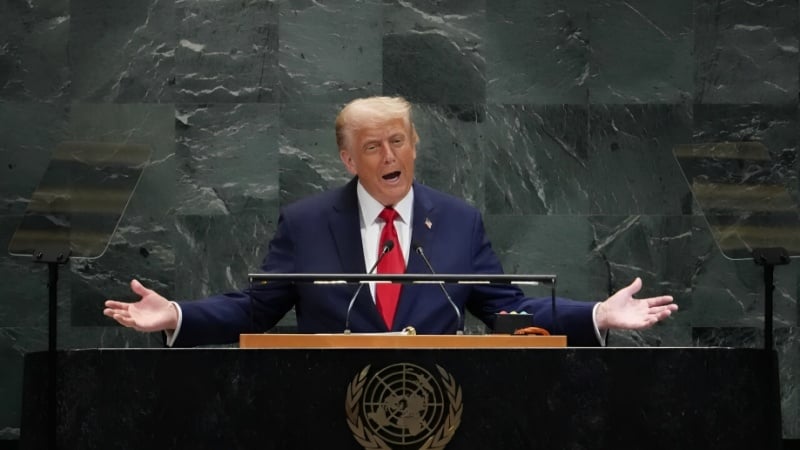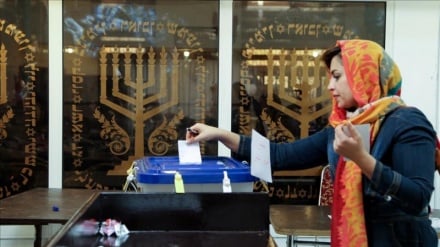Why Trump insists international community believes his lies about Iran?
-

Donald Trump speaking at the United Nations
Pars Today – In his speech at the 80th session of the UN General Assembly, the U.S. President once again repeated his baseless claims against Iran.
According to Pars Today, controversial U.S. President Donald Trump reiterated his accusations against Iran during the UN General Assembly, claiming that Iran should not possess nuclear weapons without acknowledging that its nuclear facilities have undergone the most inspections. He alleged Iranian support for terrorism and simultaneously stated openly that his country, in collusion with the Israeli regime, had carried out attacks on Iranian territory.
Trump claimed that he had written and sent a letter to Iran’s leadership to communicate the U.S. position on Iran’s nuclear program, saying that Iran’s response was to continue its nuclear activities. Without mentioning that Israel is the only country in the world not party to the Nuclear Non-Proliferation Treaty, the U.S. president stated that efforts to curb nuclear weapons development must start with Iran. Trump further claimed that no other country in the world besides the United States would have been able to destroy Iran’s nuclear facilities.
Continuing his boastful and extraordinary claims about promoting global peace, Trump asserted that he ended seven “endless wars” in seven months—some lasting 31 years, one 36 years, and another 28 years. He named these conflicts as those between Cambodia and Thailand, Kosovo and Serbia, Congo and Rwanda, Pakistan and India, Israel and Iran, Egypt and Ethiopia, and Armenia and Azerbaijan. Trump’s claim, which he had made previously, has been denied by countries such as India.
Despite his promises to end the war in Ukraine in a single day, he has achieved no success in this regard. Regarding the Israeli attack on Iran, carried out in collusion with the U.S., no formal ceasefire has been established, and the situation between Iran and the Israeli regime remains one of neither war nor peace.
At the same time, as expected, Trump used his UN speech to spread lies about Iran, reiterating his usual claims regarding Iran’s alleged pursuit of nuclear weapons and its purported support for terrorism.
The reasons why Trump and certain officials in his administration insist that the international community accept the lies they spread about Iran can be listed as follows:
1. Political and strategic agenda:
During his presidency, Trump sought to shape U.S. foreign policy in line with what he viewed as America’s interests. One key policy was exerting pressure on Iran through a “maximum pressure” campaign, including curbing oil exports and attempting to reduce or sever Iran’s relations with other countries. From his perspective, making accusations and spreading falsehoods about Iran—particularly regarding its nuclear activities and alleged support for terrorism—served as a tool to increase pressure on Tehran and compel it to accept U.S. demands.
2. Promoting a negative image of Iran:
During his first term, Trump was strongly opposed to the JCPOA nuclear agreement and, by withdrawing from it, sought to create a negative image of Iran in global public opinion. This approach has been pursued even more aggressively in his second term, continuing and expanding the “maximum pressure” campaign, promoting Iranophobia, and accusing Iran of various wrongdoings. This negative portrayal allows Trump to leverage various tools of pressure in any future dealings with Iran or in urging other countries to reduce or sever relations with the country.
3. Reinforcing support for Israel:
Another reason for accusing Iran, especially from the podium of the United Nations—where senior officials from member states typically attend the U.S. president’s annual speech—is to justify comprehensive support for the Israeli regime, including military and arms assistance, under the pretext of Iranian threats. During his presidency, Trump has consistently been a strong supporter of Israel, and many of his policies, including withdrawing from the JCPOA and imposing sanctions on Iran, have aligned with Israel’s interests and objectives. This is particularly significant given Israel’s ongoing efforts to weaken and isolate Iran and foster a negative global perception of the country.
4. Domestic considerations:
Within the United States, certain political elites and specific factions—particularly hardline Republican groups and coalitions aligned with pro-Israel lobbies such as AIPAC—are strongly opposed to Iran and its activities. In this context, Trump’s insistence on portraying a negative image of Iran internationally can serve as a tool to bolster domestic support, especially among Republicans and pro-Israel lobby groups, and to secure targeted voter backing.
Ultimately, given the political approach of Trump and other senior U.S. officials, such as Secretary of State Marco Rubio and Secretary of Defense Pete Hegseth, toward Iran, it appears that their insistence on accusing and demonizing Iran is primarily aimed at advancing U.S. geopolitical and strategic objectives—particularly concerning Iran and other regional actors—and furthering the interests of the Israeli regime.


